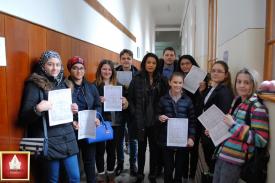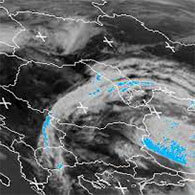Statement delivered by the MFA Secretary of State Bogdan Aurescu at the Statelessness Conference
Statement delivered by the MFA Secretary of State Bogdan Aurescu at the Statelessness Conference 1524
Marime text
1524
Marime text
Ladies and Gentlemen,
I welcome the organization of this event dedicated to this very important issue and I congratulate the UNHCR and the Romanian Forum for Refugees and Migrants for this initiative. I trust that the active participation of our distinguished guests would stimulate a highly productive debate.
Nationality is one of the keys to full participation in society and decision - making to accessing a wide range of rights. The whole society is build around the special tie between the state and its citizens. When this protective tie does not exist or it is curtailed, the consequences are very often marginalization and exclusion for the affected persons.
In a nutshell, statelessness is a lack of protection, dignity and identity. It prevents people from fulfilling their potential as they fail to exercise fundamental human rights guaranteed by a specific constitutional framework, especially political rights.
As a response to mass denationalization and population movements that took place during the Second World War and immediately thereafter, the Universal Declaration of Human Rights recognized the right to nationality. States retain broad discretion to define eligibility for nationality but this responsibility has to be exercised in conformity with the principles and norms of international human rights law.
The international treaty regime has been developed to address the problems of statelessness, including most notably the 1954 Convention relating to the Status of Stateless Persons and the 1961 Convention on the Reduction of Statelessness.
The 1954 Convention regulates the status of non-refugee stateless persons and ensures that they enjoy fundamental rights without discrimination, while the 1961 Convention sets out obligations on States to eliminate and prevent statelessness in nationality laws and practices.
Unlike the 1951 Convention relating to the Status of Refugees, the number of States Parties to the Statelessness Conventions is still worrisomely low. As part of our commitment to uphold international law and advance the international standards of protection in the humanitarian field, Romania became party to both Conventions on 27 January 2006.
Against this backdrop, we join the calls of the UNHCR in promoting wide accession to these legal instruments, as we believe they are valuable tools in the protection of stateless persons. Due to the different approaches taken by States with regard to the acquisition and loss of nationality, tackling statelessness can only be achieved through international cooperation with the view to gradually build a system of common rules.
One of the topics on the agenda of the Conference refers to the reservations formulated by Romania on its accession to the 1954 Convention. As a matter of principle, the Romanian authorities have always been open to evaluate opportunities to improve the national legislation. Along these lines, we will engage with an open mind in these debates while hoping to feed our own internal analysis on the issue with fresh ideas and perspectives. An updated overview of the situation on the ground - focused on the implementation by Romania of the 1954 Convention - would also be, most probably, required.
I will not enter into details. Basically, there are 2 ways to enhance protection of stateless persons, beyond ensuring respect for the rights and obligations provided by the two Conventions: a). to facilitate granting citizenship; b). extending - domestically - the benefit of more rights.
Distinguished participants,
While often linked to or confused with refugees and internally displaced people, statelessness is a distinct phenomenon. Whereas all refugees are stateless - de jure or de facto, many stateless persons are not refugees.
In the aftermath of the Cold War, the persistent problem of statelessness has come to be more widely recognized, as a source of regional tensions and social instability. The response of the international community has improved in recent years. However, unlike refugees, the protection needs of this vulnerable group are very often not met.
The international law provides, indeed, for a robust set of rights and protection measures for stateless persons. Efforts have been undertaken to ensure to non-citizens, including to stateless persons, the exercise of more rights and freedoms. Take, for instance, the 2006 Venice Commission Report on „Non-citizens and Minority Rights" - as a substitute member of the Venice Commission, I had the chance to be one of the rapporteurs. The Report recommended that States on the territory of which large number of persons without citizenship reside and fulfil certain conditions that might induce the conclusion that they belong to a minority group, devote particular attention to regularize without delay the situation of those who lost their citizenship - which will help promote fuller integration of those non-citizens. It also recommended for those states to consider the possibility of extending the scope of protection of the rights and facilities concerned to non-citizens, whether the particular context of that state makes it relevant.
But, it is up to the Governments - us included - , with the support of the international organizations and the civil society, to take action to steer the procedural and institutional mechanisms needed to implement these provisions. Undoubtedly, there is room for improvement. We need to better understand the task at hand in order to deliver results more efficiently.
Distinguished participants,
The era of globalization is also the era of the individual. The development of the human rights framework has placed the accent on the moral and legal primacy of the individual.
The UNDP envisaged in its famous 1994 Human Development Report that "the idea of human security is likely to revolutionize society in the 21st century". In comparison to traditional notions of security, related more to nation-states than to people, the object and purpose of the emerging doctrine of human security is the individual.
The value of the human security concept is that it offers space to address some of the gaps in international law, including with regard to refugees and stateless people.
During the last years, the Romanian authorities have strived to give substance to our contribution in the humanitarian field, by offering protection to persons of concern to international community. Not only as a donor country, but also as a State hosting the first emergency transit centre for refugees in the world, in Timisoara and, most recently, as a state of resettlement.
I take this Conference as yet another effort to build - in practical terms - the concept of human security.
Your Excellencies,
Ladies and gentlemen,
Not least, I would like to salute the involvement of the Romanian Parliamentarians in this exercise. They can contribute to the awareness-raising process on the dangers of statelessness and bring their support to initiatives meant to combat this phenomenon.
Citizenship is important to have a decent human life. The international community has made important efforts to protect the rights of stateless persons but progress toward ending this problem is limited. We all need to do a better job to close the gap that still exists between discourse and reality.
Thank you.
Urmareste-ne pe Grupul de Whatsapp
 Fondul Documentar Dobrogea de ieri și de azi
Fondul Documentar Dobrogea de ieri și de azi








_thumb2.jpg)























